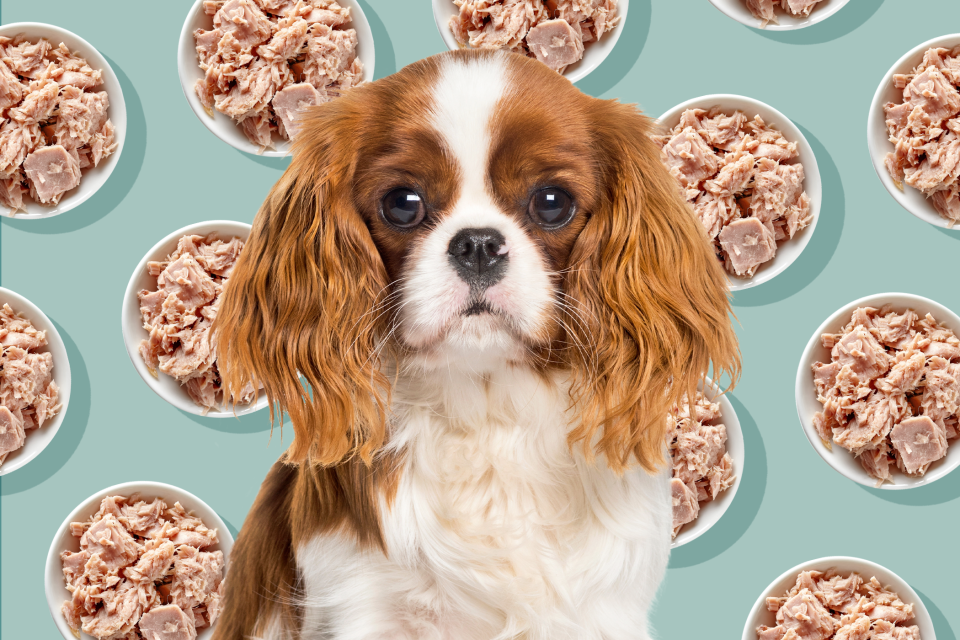Can Dogs Eat Tuna?
Did Fido sneak a bite of tuna from Kitty's bowl? Gobble up your leftover lunch on the counter—or worse—in the trash?
As your full, sweet pup sits and smiles at you in delight, you might be thinking, 'Can dogs eat tuna? Is it bad for dogs? Or is tuna good for dogs?'
We spoke with a veterinarian to find out whether your dog can safely eat tuna or if it's best to avoid this fish at all costs.

bigacis / Getty / Eric Isselée / Adobe Stock
Should You Give Your Dog Tuna?
Whether you're looking for a new healthy snack to feed, or your canine companion just treated himself to someone else's meal, you may wonder if tuna is OK for your dog to eat. After all, tuna is known for being packed with nutrients, such as protein, omega-3 fatty acids, and B vitamins for muscle gain, cardiovascular health, and cell health.
So, does tuna pose a risk to our pups?
"Tuna is not technically toxic for dogs and in small amounts, will not hurt them," says Jamie Whittenburg, DVM at Senior Tail Waggers and owner of Kingsgate Animal Hospital in Lubbock, Texas.
It's fantastic news that this savory fish is safe for dogs to eat, but there are a few things you should know before feeding your dog tuna.
RELATED: 10 Toxic Human Foods Dogs & Cats Should Never Eat
Why Tuna Is Bad for Dogs
We often associate tuna with cats since it's no secret they totally love it. But even for our fish-fancying felines, veterinarians only recommend feeding tuna as an occasional snack.
Why? The same reason it's bad for dogs—mercury. Mercury is a toxic metal found in water. As a result, all fish have varying levels of mercury in their systems. "Tuna can contain high levels of mercury," Whittenburg says. "If a dog consumes large amounts, it could cause mercury poisoning."
And mercury poisoning can cause irreversible neurological and renal damage. Signs of mercury poisoning in dogs include:
Stomatitis
Pain
Shock
Blindness
Loss of coordination
Death
The possibility of mercury poisoning is indeed alarming. However, tuna can be fed in small amounts every once in a while! (Just keep in mind tuna is not nutritionally balanced.)
"Fish, including tuna, can have health benefits for dogs and are used in commercial dog food recipes," Whittenburg says.
If you'd like to feed your pooch tuna, cook the tuna before serving a small amount proportioned to your dog's necessary daily calorie intake. Be sure to also see how your dog handles eating it. While rare, some dogs may be allergic to fish.
Signs of food allergies in dogs include:
Vomiting
Diarrhea
Additionally, it's recommended to follow the 10 percent rule, where no more than 10 percent of your dog's daily calories come from snacks. Tuna is nutritious. But it's best to keep portion sizes small considering the risks of overfeeding.
If you're looking for a safer option of fish to feed your dog, Whittenburg recommends tilapia, salmon, catfish, and whitefish.
What To Do if Your Dog Eats Tuna
If your dog has eaten tuna, how you should proceed depends on a few factors.
"If your dog accidentally ingests a small amount of tuna, this is likely not a cause for concern. Dogs with sensitive stomachs may experience some gastrointestinal distress and diarrhea," Whittenburg says. "If your dog got into the trash or ate a dish that includes tuna, you need to make sure that there were not toxic foods in the dish, such as garlic and onions. If your dog ate a large amount of tuna, ate something toxic in the tuna, or is experiencing any gastrointestinal issues, they should be seen by their veterinarian as soon as possible."

